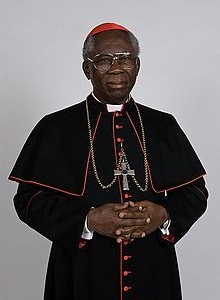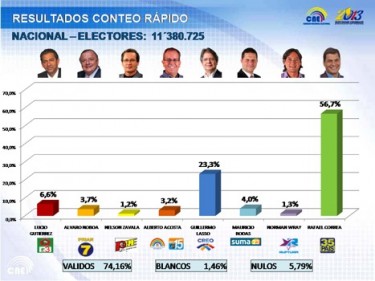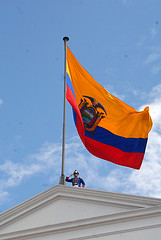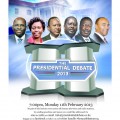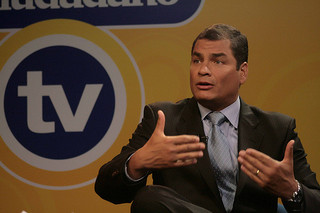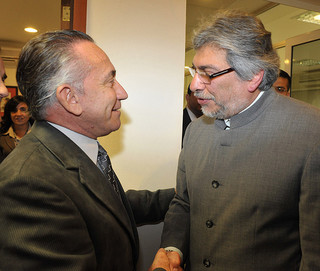Stories about Elections from February, 2013
Burundi: Violent Suppression of Demonstration Support for Imprisoned Journalist
The Court of Burundi revised the life sentence for journalist and Radio France International correspondent Hassan Ruvakuki on appeal, reducing his sentence to three years imprisonment. Media professionals demonstrated in sympathy weekly outside the Bujumbura Court building since the sentence was handed down until violent suppression of a march by the authorities.
Online Course in Spanish on Election Coverage
The Knight Center for Journalism in the Americas is offering a Massive Open Online Course (MOOC) in Spanish on “How to Improve Electoral Coverage.” The course will be taught by...
Monitoring Dangerous Speech in Kenya
Umati is a project that seeks to monitor and report the role of new media on an election: “Our Kenya-based project has citizens at its core and uses relevant technologies...
The Land Problem in Kenya
Chrenyan discusses the land problem, which has become an election issue in Kenya: “It is a historical injustice for the Kenyatta family to own (it is said) half a million...
Brazil: Citizen Journalists Expose City's Unfinished Works
Project Amigos de Januária has shed light on the failure of a local Brazilian government, marred by a legacy of administrative wrongdoing and poor accountability, to complete public works projects on time.
How Would Africans Feel about A Black Pope ?
Following the surprise resignation, the debate on Benedict XVI's succession was immediately launched. In particular, Africans, on the basis of the fastest growing contingent of Catholics on their continent, began to put forward the names of their favourites among the 18 cardinal Africans who are part of the College of Cardinal and who will meet in conclave to elect the new pope.
Ecuador's Political Future After Correa's Reelection
On February 17 Rafael Correa was re-elected as the president of Ecuador. According to the quick count, the ruling party also obtained at least 96 of the 137 seats in the new National Assembly. Bloggers were quick to analyze the political future of Ecuador under a new Correa mandate and a new political force in the role of the opposition.
St. Vincent, Grenada: Silly Electoral System?
The stupidity is the electoral system we operate under that leaves thousands without a political voice in the Parliamentary Halls. A landslide victory for the opposition in Grenada's national elections...
Journalist's Stabbing a ‘Warning’ for Tajik Opposition
A Tajik journalist and critic of the regime is in hospital after being stabbed in Moscow. The netizens in Tajikistan have little doubt that the attack on the journalist was politically motivated and that it was a taste of things to come in the months leading to presidential elections due in November.
Barbados: Elections Tomorrow
As Barbados gets ready for its national elections tomorrow, two blogs share their perspectives, here and here.
Egyptians Elected Morsi Because …
On Twitter, Egyptians who voted for Mohamed Morsi in the Egyptian presidential elections in June 24 are remorseful - and their regret is evident in a new hashtag which reads: I elected Morsi because .. The hashtag [ar] #انا_انتخبت_مرسي_عشان generated tongue-in-cheek and sarcasm. Morsi, the Muslim Brotherhood candidate, won the presidential runoff elections against Ahmed Shafik, the last prime minister of Hosni Mubarak, who resigned after 32 years following 18 days of country-wide protests against his rule.
Australian Senator Deported for ‘Interfering’ in Malaysian Politics
Australian senator Nick Xenophon was detained for 15 hours at the Kuala Lumpur airport in Malaysia before being deported after he was accused of being an ‘enemy of the state.’ Malaysian officials said Xenophon “could cause disorder and could be a danger to the community.”
Ecuador Elections: Another Term for President Rafael Correa
On Sunday, February 17, 2013, 11.6 million people in Ecuador went to the ballot boxes to exercise their right to vote. Preliminary results show that President Rafael Correa has won.
Ecuador: No Place for ICTs
With the elections in Ecuador approaching on Sunday, February 17, blog Bitácora de Calú shares its surprise [es] that “NONE of the candidates [running for the National Assembly] focus their...
Kenya's Presidential Debate Ends on TV, Continues on Twitter
With only three weeks until Kenya's presidential elections, technology continues to change how the country participates in the electoral process. Kenyans submitted questions via Twitter for the first ever presidential debate on February 11, and an online election monitoring meant to keep the upcoming elections fair launched the same day.
Malaysians to Psy: “Don't Perform for Corrupt Ruling Party”
Global pop sensation Psy has been invited to perform at an event in Malaysia hosted by Prime Minister Najib Razak and the ruling Barisan Nasional coalition, but instead of being welcomed, many fans have turned to his Facebook page pleading him not to attend and perform at the Chinese New Year event.
Chile: Controversial Campaign of a Presidential Candidate
The launch of the campaign of Laurence Golborne, in representation of the Independent Democratic Union, has created rejection within the country. In this post, we offer a summary of public reaction.
Ecuador: Stabbing Spree at President's Rally in Quinindé
On the night of Monday, February 4, 2013, in Quinindé, in Esmeraldas province, a man stabbed several people on a political rally by President Rafael Correa, causing the death of two citizens and injuring another four.
Paraguay After Presidential Candidate Lino Oviedo's Sudden Death
Lino César Oviedo, Paraguayan general and polítician, died on Saturday, February 2, 2013 when the helicopter he was traveling in crashed in northern Asunción. His pilot and his bodyguard died too.
African Union Panel of the “Not-So-Wise”
Collins Mbalo wonders whether the African Union Panel of the Wise and the COMESA/IGAD committee of elders was unwise in their assessment of whether Kenya is ready for peaceful elections...
Peru: Lima's Electors Caught Between Yes and No
In a municipal recall referendum set for March 17, voters in Lima will decide whether the city's first mayoress is to stay or go. And both the YES and the NO sides have come out swinging.

.jpg/320px-Road_between_Bujumbura_and_Congo_border_-_Flickr_-_Dave_Proffer_(4).jpg)


